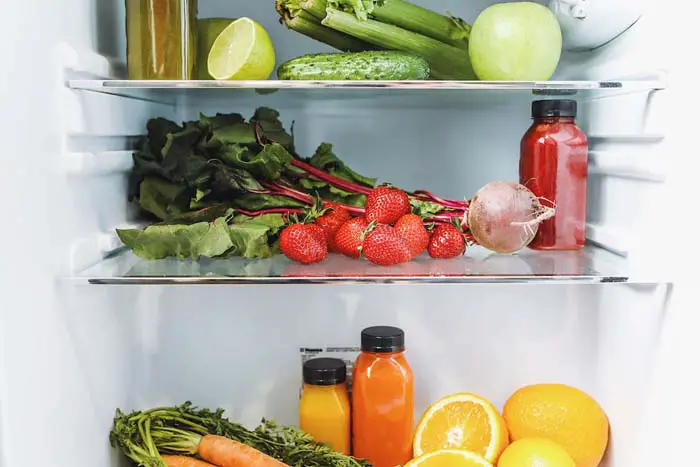Sometimes, the refrigerator isn’t the ideal option for keeping perishables fresh. Most food items should never go into the refrigerator.
Whether you’ve bought tomatoes to make your own pasta sauce or chocolate to satisfy your sweet tooth when the need strikes, it’s critical to know how to store these foods to stay fresh and tasty.
Isn’t it true that food keeps better in the refrigerator? Slow down a bit. You can prevent food poisoning by keeping certain foods refrigerated. At room temperature, though, some foods fare better. Other than that, what is the question? It isn’t always easy to tell.
Refrigeration is the best place for eggs, meat, and milk, but what about potatoes, tomatoes, and avocados?
To make the most of your grocery budget, it’s important to know which items you should keep cold and which you should keep warm.
Foods you should never store in the fridge.

Avocados
Keep avocados in the refrigerator if you want to eat them within a short period of time. The avocado will ripen quickly at room temperature if you purchase a nearly-ripe one and want to use it shortly.
You can extend the shelf life of avocados by storing them intact in the refrigerator. You can do this if you don’t intend to use them immediately or are buying in large quantities. If the avocado is exceptionally hard and green, leave it at room temperature for a few more days before using it.
Tomatoes
Whether or not to store tomatoes in the refrigerator is a perennial debate among home cooks and gardeners alike. Refrigerating whole tomatoes isn’t necessary. The frigid air might make your tomatoes pale and tasteless when served.
Store these food items at room temperature for the best taste, avoiding direct UV rays. The best way to use up any remaining tomato slices is to store them in an airtight container in the refrigerator for two to three days.
Bananas
Can you keep bananas in the fridge? Sure, but it’s not a good idea. Bananas, being tropical fruits, don’t do well in cold temperatures. The ripening process halts when you refrigerate the bananas. This results in blackened banana skins and spoiled fruit. Store them on your kitchen counter at room temperature if at all possible.
Coffee
Do not keep coffee brewed, round, or whole in the refrigerator. For example, those stale crumbs at the bottom of your fridge tend to get absorbed by coffee beans, giving your morning cup an off-putting flavor.
Sweet potatoes
As with potatoes, storing sweet potatoes in the refrigerator will alter the chemical composition of the veggies. This results in a loss of both their texture and taste. Keep them in a well-ventilated, cold, dark pantry or cabinet or pantry.
Hot sauce
There’s no need to keep your hot sauce in the fridge if you don’t want to. Bacterial growth is inhibited because of the vinegar content. The chili’s heat will be considerably more potent if kept at room temperature, just like other foods.
Spices
There is no need to refrigerate spices. You don’t have to cool them to preserve their texture and flavor, so feel free to replenish your spice cabinet whenever the mood strikes.
Potatoes
Is it necessary to keep potatoes in the refrigerator? There is no need to keep potatoes in the refrigerator. Storing these tubers below their ideal temperature of 45°Farenheit reduces their texture and quality.
To keep them fresh, store them in a root cellar or cupboard instead of the compartment at the bottom of the fridge for storing veggies and fruits. Store potatoes with apples in a cool, dark place to avoid sprouting.
Jam
If securely packed in a sterilized jar, you can store jam at room temperature for up to 24 months. Keep the jam in the refrigerator after opening it to prevent mold growth. If you’re unsure, check the label on the specific jam jar.
Pastries
Keeping pastries at room temperature and covered in a paper bag ensures they will always be perfect. If you store your pastry treats in the refrigerator, they will get soggy and limp as a result of the moisture.
Onions and Garlic
It would be best if you didn’t keep garlic and onions in the refrigerator. Even if you store them in the refrigerator, they may actually begin to spoil faster.
Unless already peeled and prepared, refrigerated garlic loses its flavor and potency faster than fresh garlic. Keep it out of direct sunlight and in a dry, well-ventilated area at room temperature. Leaving the bulbs whole until you’re ready to use them will extend their lifespan. Try creating garlic oil to use up some of your excess garlic bulbs.
Mold can grow on onions and garlic if you keep them in an overly humid or wet environment, such as a fridge. As an alternative, be sure to store them in a well-ventilated, cool, dark place.
Store onions in the refrigerator for up to ten days if you seal them tightly in an airtight container or wrapped in plastic.
Hot Sauce
If you store hot sauce in the refrigerator, it will lose heat and become less spicy. The high level of vinegar prevents bacteria growth in most hot sauces, which helps keep them fresh.
Bread
“Does bread remain longer in the fridge?” is a common question. For this reason, many of us put our loaves in the refrigerator, assuming they’ll stay fresher longer.
Bread should not be kept in the refrigerator. Bread deteriorates considerably more quickly in the refrigerator than at room temperature. Consider putting it in a sealed plastic container or bag in a cool, dry location.
Nuts
Nuts’ natural oils can be preserved at lower temperatures, but so can their flavor. If you’re going to use the nuts within the next two weeks, it’s best to keep them in the pantry, out of direct sunlight, in an airtight container. But if you want to keep the food in the freezer for more than one month and up to 6 months, do so.
Melon
It takes up a lot of space in the fridge, but whole melons ripen more slowly. When it comes to getting the finest flavor out of your melons, leave them to mature on the counter.
You should use a plastic bag to wrap the cut side and store it in the refrigerator. Any melon pieces you have not eaten within three days should be stored in an airtight container and refrigerated.
Honey and Molasses
Is honey safe to eat at room temperature? There is no need to keep this one in the refrigerator. This food has a high sugar content, which acts as a natural preservative.
Honey’s crystallization speeds up when you store it in an ice chest, making it difficult to squeeze into your tea. Another approach to avoid crystallization is to use dry, clean utensils when you want to scoop honey out of a container.
Molasses is the same way. Sugar-making produces a syrup that is both sweet and dark in color. To scoop or pour, it gets excessively thick after you refrigerate it. An open molasses jar can remain for years in the cupboard if extra moisture doesn’t get in.
Dried fruit
Refrigerating dried fruits will simply increase their moisture content. It is ideal for keeping them in an airtight container in a dry, dark place. They can survive up to 6 months if you store them properly.
Chocolate
Chocolate, like coffee, takes on the flavors and smells of everything it comes in contact with, so don’t keep it in the refrigerator.
Store your sweets in a separate, cool, dark, air-tight cabinet to avoid absorbing the flavors of your spices. You can preserve chocolate in this manner for several months.
Mangoes
It is best to keep unripe mangoes at room temperature, just like avocados, because the cold slows down ripening. Once softened, place them in a plastic bag and store them in the refrigerator.
Peanut butter
In the fridge, peanut butter can harden and become heavy, making it difficult to spread on your toast. On the other hand, natural peanut butter is a bit of a gray area. While you can store the spread in the refrigerator for longer periods of time, the oils tend to separate. This makes it more difficult for a person with poor mixing skills to return the product to its original consistency. Consume it within 6 to 9 months; leaving it out of the refrigerator will be fine.
Aubergines
While aubergines do not require refrigeration, they should not be left in a hot environment because they may shrink. Keep them out of direct sunlight and in a cool, dark area to get the most out of this ingredient.
Fresh soft herbs
When it comes to delicate herbs like dill, mint, basil, parsley, and coriander, you should treat them like bouquets: cut them and preserve them in a glass of water. The leaves will quickly wilt and become soggy if you keep them in the fridge. But you should keep hard herbs like oregano, thyme, rosemary, and sage in the crisper drawer of your refrigerator in an airtight container. This is because they are hard to work with.
Apples
Apples can lose their flavor and texture if stored in your refrigerator. Once they’ve been out of the fridge for a week, put them back on the counter if you haven’t eaten them.
Peaches
If the peaches aren’t yet ripe and ready, don’t put them in the refrigerator. Cold weather slows the ripening process for this and other stone fruits, so you’ll have to wait longer to enjoy them. In addition, they are more likely to go bad. Instead, keep them at room temperature and just chill when you’re ready to eat.
Conclusion
You can reduce food waste in your own house if you know which foods you shouldn’t store in the refrigerator and which should be kept at a lower temperature. It’s a good idea to take a moment to think about how you’ll store your groceries so you do not end yourself rebuying things you already have.

